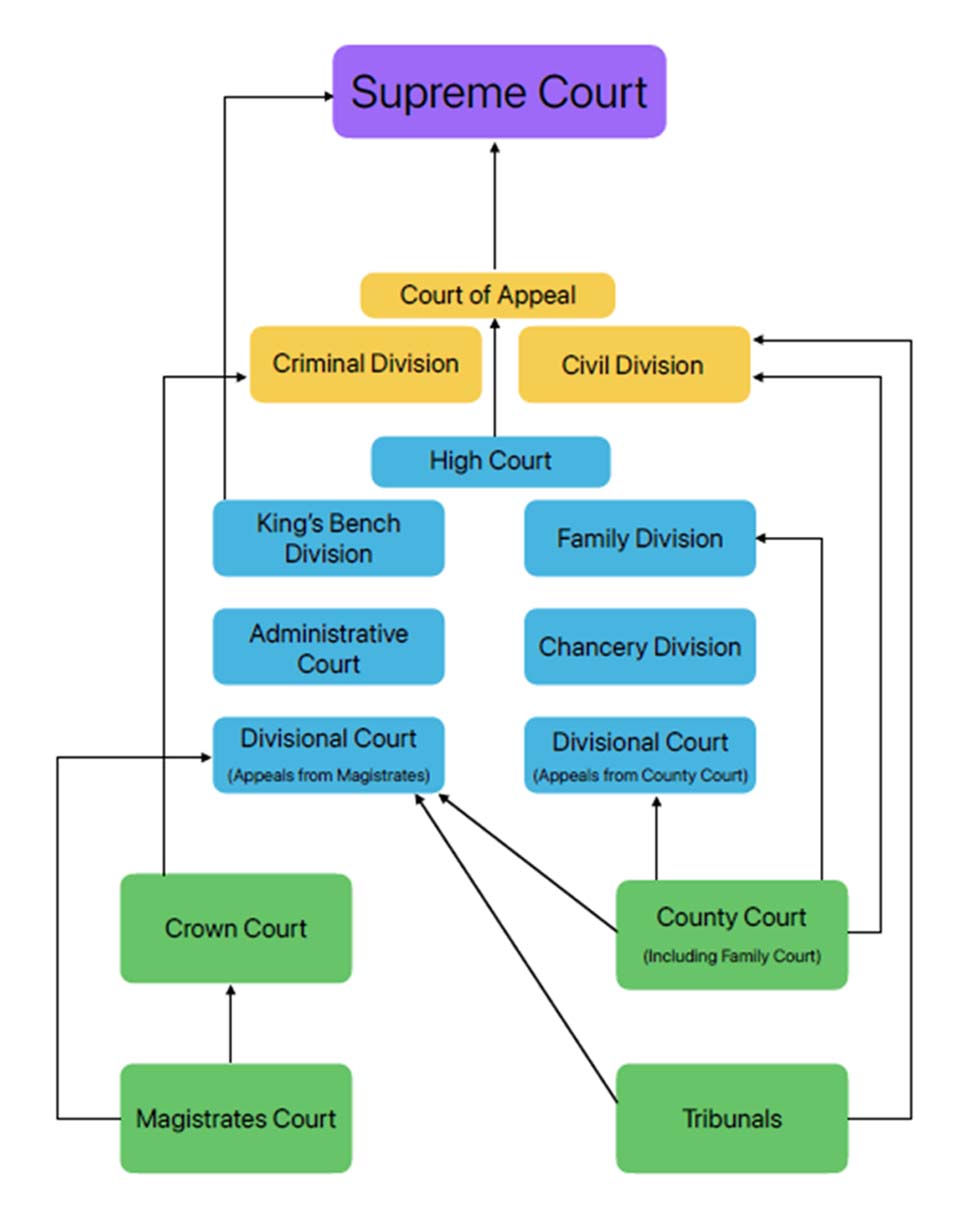The UK Court System Explained – How the Court Hierarchy Works
In this guide, we’ll explain how the UK court system works, covering everything from the Magistrates’ Court to the Supreme Court, so you can understand where your legal issue may be heard.
At Gavin Edmondson Solicitors, we understand that facing a legal issue can be stressful, especially if you’re unfamiliar with how the Court system works. Our goal is to not only represent you, but also guide you confidently through the legal process.
One of the most common questions we are asked is: “Which court will my case be heard in?”
Here, we will walk you through a simplified overview of the hierarchy of Courts in England and Wales, and how we can support you at each stage.
THE UK COURT STRUCTURE – A SIMPLE OVERVIEW

The court system in England and Wales is run by HM Courts and Tribunals Service (HMCTS) and is designed to deal with different types of legal cases depending on their complexity and seriousness. Here’s a clear summary of the main Courts you might come across:
Magistrates’ Court
What it handles:
- Most criminal cases start here
- Some civil matters (e.g. council tax arrears).
- Youth courts
- Trials of summary offences
- Family proceedings
- Committals to the Crown Court
It is frequently very helpful to have a local trusted solicitor to represent you here.
There is no jury at a Magistrates Court – decisions are made by Magistrates or a District Judge.
County Court
What it handles:
- Most civil cases, including:
- Personal injury claims
- Contract disputes
- Debt recovery
Cases are heard by a District Judge or Circuit Judge.
Our experienced Personal Injury solicitors often appear at County Court.
Crown Court
What it handles:
- Serious criminal cases (like robbery or assault)
- Appeals from Magistrates’ Court
- Sentencing for certain cases
Has both a Judge and a Jury. Criminal defence solicitors appear at Crown Court.
High Court
What it handles:
Complex civil cases and appeals, divided into four divisions:
- Queen’s Bench Division – personal injury, breach of contract, commercial litigation etc.
- Family Division – complex divorce and family law issues.
- Chancery Division – equity & trusts, property, contested probate, tax, bankruptcy and business disputes.
- Divisional Court – appeals from the Magistrates’ Courts.
Note: Only Solicitor Advocates, who have obtained their Higher Rights of Audience can appear in Crown Court and the Higher Courts, such as the High Court, Court of Appeal and the Supreme Court.
Court of Appeal
Divided into:
- Criminal Division – hears appeals from the Crown Court.
- Civil Division – hears appeals from the High Court, tribunals and some County Court cases Courts.
Supreme Court
The highest court in England & Wales; it only hears a small number of cases, usually ones involving matters of national importance or complex points of law.
You don’t need to worry about the complexities or details of the system – that’s what we’re here for.
Why Our In-House Solicitor Advocate Makes a Difference
One of the unique advantages of working with Gavin Edmondson Solicitors is that we have a solicitor advocate in-house. But what does that mean for you?
A Solicitor Advocate, like Gavin Edmondson is a qualified solicitor who also has Higher Rights of Audience – meaning he can represent you not just in the County Court or Magistrates’ Court, but also in the Crown Court, High Court, Court of Appeal and even the Supreme Court.
What this means for you:
- Consistent representation – A legal expert who can handle your case from start to finish.
- Often no need to hire a separate barrister – Saving you time, stress, and often, money.
- Expert advocacy – We can argue your case robustly in court, just like a barrister would.
- Stronger client relationship – You work with someone who knows your case inside out, not someone who’s briefed the night before.
Having this ability in-house means we can provide a smoother, more seamless service, ensuring that your voice is heard clearly at every level of the court system.
Legal issues can be stressful, but you don’t have to face them alone. Whether your case is heard in the County Court or escalates to the High Court, our team is ready to support you with expert advice, practical help, and strong representation.
If you have any questions or want to speak to a member of our team, just get in touch. We’re here to help.
Frequently Asked Questions
Usually personal injury claims are an area of Civil law and are usually heard in County Court, however higher value claims can be heard in the High Court.
The Crown Court usually deals with serious crimes such as murder, rape and robbery. However, Magistrates can also refer cases to the High Court, if they decide the case is serious enough to warrant this, or if they do not feel they have the power to hand down a severe enough sentence for the crime.
No. Only barristers, and Solicitors Advocates who have obtained the Higher Rights of Audience are able to represent you at Crown Court.
Gavin Edmondson has Higher Rights of Audience and can represent you at any Court.
Ready to take the next step?
Book your free, no-obligation consultation and get advice tailored to your case.
Book your no-obligation consultation by calling 01606 811700. You can also email us or fill out our quick online enquiry form, and we will get back to you promptly.

